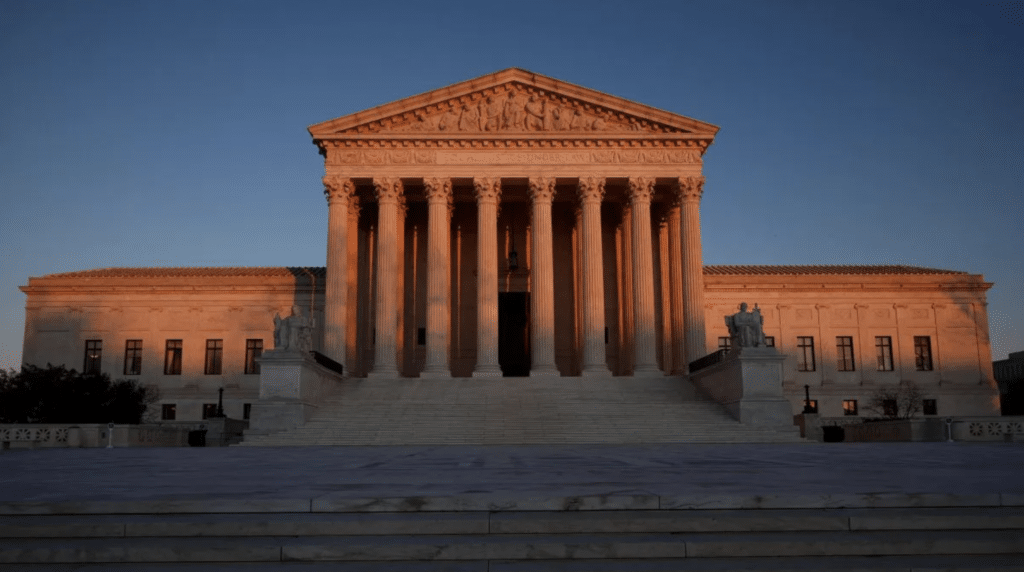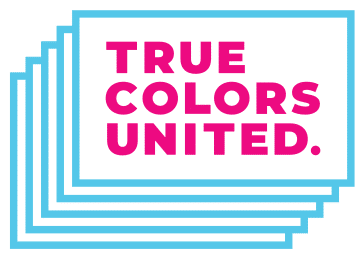
Overturning Roe v Wade will have devastating effects on people of color, LGBTQ+ people, and people experiencing homelessness.
Update: On June 24, 2022, the U.S. Supreme Court overturned Roe v. Wade – erasing the Constitutional right to an abortion. When this decision was first leaked back in May 2022, True Colors United spelled out its potential impacts on LGBTQ youth and youth of color experiencing homelessness in the following blog post. That possibility has now become a reality.
First, some background information.
On the evening of Monday, May 2, Politico published a leaked draft of a U.S. Supreme Court majority opinion written by Supreme Court Justice Samuel Alito in the Dobbs v Jackson Women’s Health case the Court heard at the end of last year. “Opinion,” in the context of the Supreme Court, refers to the document which announces the Court’s official ruling in a case and outlines the legal argument the majority of justices believe support their decision. In cases where some Supreme Court justices disagree with the majority, they also write an opinion (usually referred to as the “minority opinion” or the “dissenting opinion”). All of these opinions go through a drafting process over a long period of time, during which they change based on the feedback of each Supreme Court justice.
The opinion published by Politico is not official, but rather a draft still in the process of being finalized. The official opinion is expected to be released by the Court sometime in the next several weeks.
What does this mean?
The draft opinion as it was published would, in essence, overturn a half century of legal protections for abortion access by reversing the decisions made in Roe v Wade (1973) and Planned Parenthood v Casey (1992), leaving people without access to abortion services in 26 states, mostly in the South and Midwest regions, that currently have either a near-total or total ban on abortion. 36 million people who can get pregnant, including cisgender women, nonbinary people, and transmasculine people, live in the 26 states facing the most immediate impact.
People and organizations who support reproductive justice across the US are now bracing for abortion rights to be gutted by the Supreme Court within the next several weeks, but it’s important for all of us to remember that not only are the justices’ legal arguments not finalized, the outcome could change between now and the official release of their decision if any of the justices change their mind, which is not unheard of in the history of Supreme Court deliberations. In particular, eyes are on Chief Justice John Roberts, whose name was not signed onto the draft, though Alito’s draft was supported by a majority of the court at the time it was drafted, even without Roberts’s support.
How will this affect LGBTQ and BIPOC youth?
The burden of the Supreme Court's decision would fall hardest on people who already face systemic racism and discrimination – including people of color, people experiencing homelessness, people who are undocumented, people with disabilities, and LGBTQ+ people, as well as people who are young, have low-incomes, or live in rural areas or certain states.
Denying access to abortion care often exacerbates existing disparities. When an individual seeks abortion services but is denied, they are three times more likely to fall into poverty than someone who can get an abortion.
The LGBTQ community experiences poverty at higher rates than non-LGBTQ people. In fact, poverty rates on average are higher among lesbian and bisexual women, young people, and African Americans within the LGBTQ community, with more than one-quarter (28%) of lesbian and bisexual women living in poverty. According to a 2015 report from the National Center for Transgender Equality, transgender people are approximately three times as likely to be unemployed as cisgender people.
You may not associate abortion as an LGBTQ issue, but studies have shown otherwise. According to one study, compared with pregnancies reported by heterosexual women who have sex only with men, pregnancies reported by bisexual and lesbian women were more likely to be unwanted.
According to a report from the Guttmacher Institute, low income women have higher rates of unplanned pregnancy and abortion, and are also less likely to have access to health insurance or health care – such as birth control. For example, the report attributes the increase in popularity of contraceptive intrauterine devices (IUDs) with contributing to the national decline in abortion rates in recent years. While IUDs are effective, they’re also expensive – putting them out of reach of many.
Southern states with the most restrictive abortion laws also tend to have high rates of maternal mortality. According to the CDC, the maternal mortality rate in Georgia is more than twice the national rate. And nationally, the maternal mortality rate for Black women is twice that for white women. Across the board, when compared to white people, Black and Indigenous people and People of Color (BIPOC) are less likely to have health insurance and often have less access to contraception and reproductive care. This can be attributed to multiple factors including scarce reproductive health providers in majority-BIPOC neighborhoods, systemic racism in health care, and socioeconomic circumstances. Of the seven states with the highest population of Black people (over 25%), five (Mississippi, Louisiana, Georgia, South Carolina, and Alabama) have a total ban on abortion.
What are the implications for youth experiencing homelessness?
Despite the decline in pregnancy and parenting among adolescents, pregnancy and parenting is common among youth and young adults experiencing homelessness. According to a report from Voices of Youth Count and Chapin Hill at the University of Chicago, 44% of young women experiencing homelessness reported being pregnant or a parent. Yet relatively few homeless services providers serve youth who are parenting, especially if they are minors or live in rural areas, further highlighting the need for additional support via reproductive care and abortion care.
This Supreme Court ruling would remove a form of trauma informed reproductive care in 26 states for youth who are forced to engage in sexual behaviors in exchange for food, shelter, or basic needs as part of survival strategy. Pregnant and parenting young people experiencing homelessness face unique barriers to health care – including trouble finding reliable transportation to health care facilities that offer reproductive and abortion care, sourcing regular access to this care, navigating fear of legal intervention, and confidentiality issues. These barriers would only be exacerbated by the Supreme Court’s decision to overturn Roe v Wade.
As of December 2021, only 13 states (Alaska, California, Connecticut, District of Columbia, Hawaii, Maine, Nevada, New Jersey, New Mexico, New York, Oregon, Vermont, and Washington) allow young people under 18 to get an abortion without parental consent. Most states require permission from a parent or older family member, or offer a judicial bypass, meaning a minor can petition the court to grant consent for them to access abortion services without parental consent or notifiction if they believe disclosing their pregnancy to their parents will put them in harm’s way. These laws prevent and delay young people’s access to self-autonomy and reproductive health, especially for youth experiencing homelessness who may not have access to their parents/guardian or legal services or who face potential violence at home.
Young people are experts in their own lives and need access to supports and services that can help them decide who should be involved in their care.
Ways to take action in support of abortion rights:
Mutual aid initiatives:
-
- Abortion Funds in Every State
- The Buckle Bunnies Fund - The Buckle Bunnies Fund is a queer-led reproductive organization that's been raising money to provide abortions across Texas, dating back to 2020.
- Here is a list of local abortion funds in trigger law states. A trigger law is a law in a state’s statutes or constitution which cannot be enforced because a court decided it is illegal, usually because it conflicts with federal law or constitutional rights. Radical anti-choice activists have worked to pass trigger laws banning abortion but which can only go into effect if SCOTUS overturns the rights secured in Roe v Wade.
- Holler Health Justice - a BIPOC and queer led racial, economic, and reproductive non-profit in West Virginia
- The Afiya Center (TAC) - The Afiya Center (TAC) was established in response to the increasing disparities between HIV incidences worldwide and the extraordinary prevalence of HIV among Black womxn and girls in Texas. TAC is unique in that it is the only Reproductive Justice (RJ) organization in North Texas founded and directed by Black womxn.
